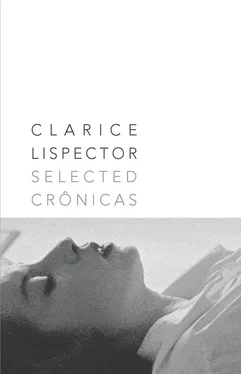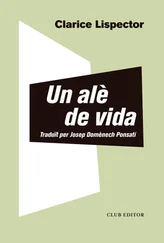The worst part of this visitation was the silence. I would raise my eyes from the typewriter and wonder how long Ofélia had been watching me in silence. What could possibly attract this child to me? Personally, I found myself exasperating. On one occasion, after another of her lengthy silences, she calmly said to me: you are a strange woman. And as if I had been struck on the face without any form of protection — right on the face which is our inner self and therefore extremely sensitive — struck full on the face, I thought to myself in a rage: you are about to see just how strange I can be. She who was so well protected, whose mother was protected, whose father was protected.
However, I still preferred her advice and criticism. Much less tolerable was her habit of using the word therefore as a way of linking sentences into a never-ending chain. She told me that I bought far too many vegetables at the market — therefore — they would not fit into my small fridge and — therefore — they would go bad before the next market day. A few days later I looked at the vegetables, and they had gone bad. Therefore — she was right. On another occasion, she saw fewer vegetables lying on the kitchen table, as I had secretly taken her advice. Ofélia looked and looked. She seemed prepared to say nothing. I waited, standing there fuming but saying nothing. Ofélia said phlegmatically:
— It won’t be long before there’s another market day.
The vegetables had run out towards the middle of the week. How did she know? I asked myself bewildered. Probably she would reply with ‘therefore’. Why did I never, never know? Why did she know everything, why was the earth so familiar to her, and here was I without protection? Therefore? Therefore.
On one occasion, Ofélia actually made a mistake. Geography — she said, sitting before me with her hands clasped on her lap — is a kind of study. It was not exactly a mistake, it was a slight miscalculation — but for me it had the grace of defeat, and before the moment could pass, I said to her mentally: that’s exactly how it’s done! just go on like that and one day it will be easier or more difficult for you, but that’s the way, just go on making mistakes, ever so slowly.
One morning, in the midst of her conversation, she announced peremptorily: ‘I’m going home to get something but I’ll be right back.’ I dared to suggest: ‘If you’ve got something to do, there’s no need to hurry back.’ Ofélia looked at me, silent and questioning. ‘There is a very nasty little girl’, I thought firmly to myself so that she might see the entire sentence written on my face. She kept on looking at me. A look wherein — to my surprise and dismay — I saw loyalty, patient confidence in me, and the silence of someone who never spoke. When had I ever thrown her a bone — that she should follow me in silence for the rest of my life? I averted my eyes. She gave a tranquil sigh. ‘I’ll be right back.’ What does she want? — I became nervous — why do I attract people who do not even like me?
Once when Ofélia was sitting there, the door-bell rang. I opened the door and came face to face with Ofélia’s mother. Protective and unbending, she had come in search of her daughter.
— Is Ofélia Maria here by any chance?
— Yes, she is, I said, excusing myself as if I had abducted her.
— Don’t do that again — she said to Ofélia with a tone of voice that was meant for me: then turning to me, she suddenly sounded peevish: I’m sorry if you’ve been troubled.
— Not at all, your little girl is so clever.
The mother looked at me in mild surprise — but suspicion flickered across her eyes. And in her expression I could read: what do you want from her?
— I have already forbidden Ofélia to come bothering you, she now said with open distrust. And firmly grabbing the little girl by the hand to lead her away, she appeared to be protecting her from me. Feeling positively degenerate, I watched them through the half-opened spy-hole without making a sound: the two of them walked down the corridor leading to their apartment, the mother sheltering her child with murmured words of loving reproach, the daughter impassive with her swaying plaits and flounces. On closing the spy-hole, I realized that I was still in my dressing-gown and that I had been seen like this by the mother who dressed the moment she got up. I thought somewhat defiantly: Well, now that her mother despises me, at least there will be no more visits from the daughter.
But naturally, she came back. I was much too attractive for that child. I had enough defects to warrant her advice, I was apt terrain for exercising her severity, I had already become the property of that slave of mine: of course, she came back, lifted her flounces and sat down.
As it happened, Easter was approaching, the market was full of chicks and I had brought one home for the children. We amused ourselves with it, then the chick was put in the kitchen while the children went out to play. Soon afterwards, Ofélia appeared for her daily visit. I was typing and from time to time I would express assent, my thoughts elsewhere. The girl’s monotonous voice, the singsong of someone reciting from memory, made me feel quite dizzy, her voice infiltrating between the words typed on the paper, as she talked and talked.
Then it struck me that everything seemed to have come to a sudden standstill. Aware that I was no longer being tortured, I looked at her hazily. Ofélia Maria’s head was erect, her plaits transfixed.
— What’s that? she asked.
— What’s what?
— That! she said stubbornly.
— What?
We might have remained there forever in a vicious circle of ‘that!’ and ‘what?’, were it not for the extraordinary will-power of this child, who, without saying a word, but with an expression of intransigent authority, obliged me to hear what she herself was hearing. Forced into attentive silence, I finally heard the faint chirping of the chick in the kitchen.
— It’s the chick.
— The chick? she said, most suspiciously.
— I bought a chick, I replied submissively.
— A chick! she repeated, as if I had insulted her.
— A chick.
And there the matter would have rested had I not seen something which I had never noticed before.
What was it? Whatever it was, it was no longer there. A chick had flickered momentarily in her eyes only to disappear, as if it had never existed. And a shadow had formed. A dark shadow covering the earth. From the moment her trembling lips almost involuntarily mouthed the words: ‘I want one, too’ — from that moment, darkness intensified in the depths of her eyes into remorseful desire which, if touched, would close up like the leaf of the opium poppy. She retreated before the impossible, the impossible which had drawn near, and which, in a moment of temptation, had almost become hers; the darkness of her eyes changed colour like gold. Slyness crept into her face — and had I not been there, she would slyly have stolen something. In those eyes, which blinked with cunning knowledge, in those eyes there was a marked tendency to steal. She gave me a sudden look betraying her envy: you have everything; and censure: why are we not the same, then I would have a chick? and possessiveness — she wanted me for herself. Slowly I slumped into my chair, her envy was exposing my poverty and left my poverty musing: had I not been there, she would have stolen my poverty as well. She wanted everything. After the tremor of possessiveness subsided, the darkness of her eyes revealed her suffering. I was not only exposing her to a face without protection. I was now exposing her to the best of the world: to a chick. Without seeing me, her moist eyes stared at me with an intense abstraction, which made intimate contact with my intimacy. Something was happening which I could not understand at a glance. And desire returned once more. This time her eyes were full of anguish, as if they had nothing to do with the rest of her body, which had become detached and independent. And those eyes grew wider, alarmed at the physical strain as her inner being began to disintegrate. Her delicate mouth was that of a child, a bruised purple. She looked up at the ceiling — the dark shadows round her eyes gave her an air of sublime martyrdom. Without stirring, I watched her. I knew about the high incidence of infant mortality. The great question she was asking concerned me as well. Is it worthwhile? I do not know, my increasing composure replied, but it is so. There, before my silence, she surrendered to the process, and if she was asking me the great question, it must remain unanswered. She had to surrender — and without anything in return. It had to be so. And without anything in return. She held back, reluctant to surrender. But I waited. I knew that we are that thing which must happen. I could only be her silence. And, bewildered and confused, I could hear her heart, which was not mine, beating inside me. Before my fascinated eyes, like some mysterious emanation, she was being transformed into a child.
Читать дальше












